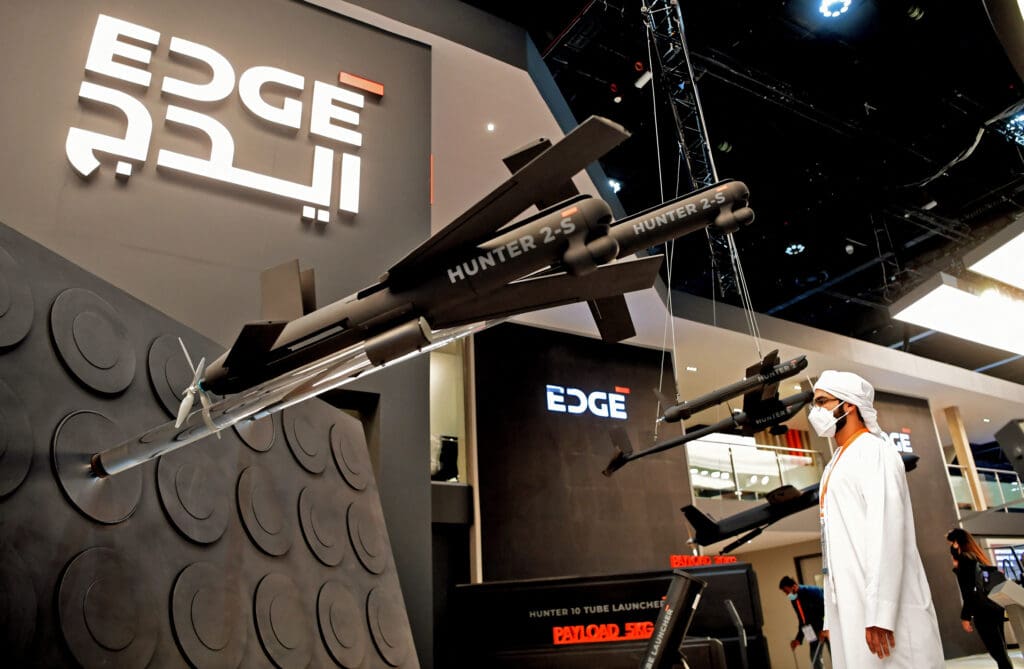The BRICS+ summit being held on October 22 and 23 in Russia marks the first with the United Arab Emirates as a full member. Since joining the bloc at the beginning of the year, the Gulf state has ramped up its cooperation with other members of the bloc, particularly Brazil. Already the Emirates’ largest trade partner in South America, Brazil is emerging as a new security partner and potential market for arms exports from the UAE’s burgeoning defense industry. The two countries’ growing engagement also reflects a shift in their priorities towards achieving greater South-South cooperation and decreasing reliance on traditional partners like the United States.
The UAE-Brazil defense relationship is spearheaded on the Emirati side by the EDGE Group—a conglomerate composed of more than 35 entities and a major player in the advanced technology and defense industries with both civilian and military applications. EDGE is set to open its first international office in Brasília as a headquarters for Latin American and has been actively acquiring majority stakes in Brazilian defense firms since 2023.
Just as the Emirati logistics behemoth DP World and its subsidiaries drove the UAE’s inroads into Latin American connectivity infrastructure and ports, EDGE is now expanding the Emirati footprint in the security sector. EDGE is betting that the region is a safer investment than some other emerging markets—one relatively insulated from global conflicts, including the wars in Ukraine, Gaza and Lebanon.
As Abu Dhabi continues to benefit from its relationship with Washington, which recently upgraded the UAE to a “major defense partner,” cementing ties with Brasilia is also less risky than courting other BRICS members antagonistic to the U.S. and offers diversity in Gulf security relationships. Nonetheless, the U.S. is still a major part of the Gulf states’ security strategies, and Washington leverages this to try to contain Russia and out-compete China. Despite ongoing economic and political hedging with both Eastern powers, and despite frustrations over what is perceived as inadequate U.S. support, pressure from Washington still impacts the UAE’s calculus.
In this sense, Latin America presents a promising frontier for EDGE to export its advanced technology and defense solutions, tapping into emerging markets that are seeking to modernize their militaries while not actively engaged in conflict. Notably, EDGE has pursued partnerships with Brazilian firms to collaborate on technology transfer, the production of advanced military equipment, and research and development. In August 2024, EDGE signed a strategic agreement with the Brazilian Air Force to jointly develop defense on unmanned and autonomous systems. Over the past year, EDGE has also acquired significant stakes in two Brazilian companies: Condor Non-Lethal Technologies and Sistemas Integrados de Alto Teor Tecnológico (SIATT).
The acquisition of Condor bolsters EDGE’s capabilities in non-lethal technologies and services— a highly specialized and rapidly expanding defense subsector. Condor is the leading global tear gas manufacturer and also produces rubber bullets, tasers and body cameras equipped with facial recognition technology.
EDGE’s partnership with SIATT, in comparison, aims to develop smart weapons and high-tech systems. As part of this effort, in September 2024, EDGE signed an agreement with the Brazilian Navy to contribute to developing the National Surface Anti-Ship Missile (MANSUP), which is slated for completion by the end of 2025. Similarly, SIATT secured key licensing permissions from the Brazilian army in October to develop the MAX 1.2 AC anti-tank guided missile with Emirati investment.
Drivers of this Shift
The two countries’ expanding defense cooperation is perhaps a natural offshoot of their deep economic relationship. Brazil is the UAE’s most significant economic partner in Latin America, and DP World has been investing heavily in ports around the continent, including a recent $500 million expansion of Brazil’s Port of Santos.
The increasing defense sector investments are an early indicator that the UAE may follow a similar playbook in South America as it has used in the Horn of Africa and elsewhere, jointly leveraging security and economic engagement for greater influence. Moreover, the UAE’s decision to join BRICS fits into its broader foreign policy strategy, which has shifted in recent years to become more fluid and open to a broader variety of partnerships.
The UAE has been doubling down on its domestic defense sector and reducing its reliance on arms imports. While maintaining good ties with Washington, the Gulf state has also been making pragmatic and transactional decisions to de-risk and diversify its economy and security. Data from the Stockholm International Peace Research Institute (SIPRI) over the past decade indicate that the UAE has reduced its reliance on arms imports by around 40%, including a significant reduction from the U.S. Meanwhile, the UAE emerged as the third-largest arms exporter in the Middle East after Türkiye and Israel. This indicates that in the long-term the country is seeking to both diversify its reliance on Western arms and become more self-sufficient overall.
In recent years, U.S. influence in the Middle East appeared to be declining. And despite Washington allocating more diplomatic and military resources to the region amid the war on Gaza and its regional spillover, the UAE and others still seem wary of overreliance on Washington without significant guarantees for their security. Nevertheless, the U.S. remains an irreplaceable security partner, particularly for Gulf states, given its unparalleled military infrastructure in the region. In order to adapt to the changing and unpredictable U.S. military posture towards security commitments, the UAE is diversifying its security relationships to develop its own defense industry, while also cementing its access to large, emerging markets geographically distant from the world’s most active conflict zones.
These moves, while significant, do not amount to an irreversible replacement strategy from the U.S. security umbrella. Like many of its neighbors in the region, the UAE will fundamentally remain reliant on Washington’s security architecture for core defense needs. However, taken together, they indicate a growing appetite for alternative defense partners and greater intra-BRICS cooperation, aimed at carving out greater strategic autonomy in an increasingly multipolar world.
The opinions expressed in this article are those of the author and do not necessarily reflect the views of the Middle East Council on Global Affairs.



